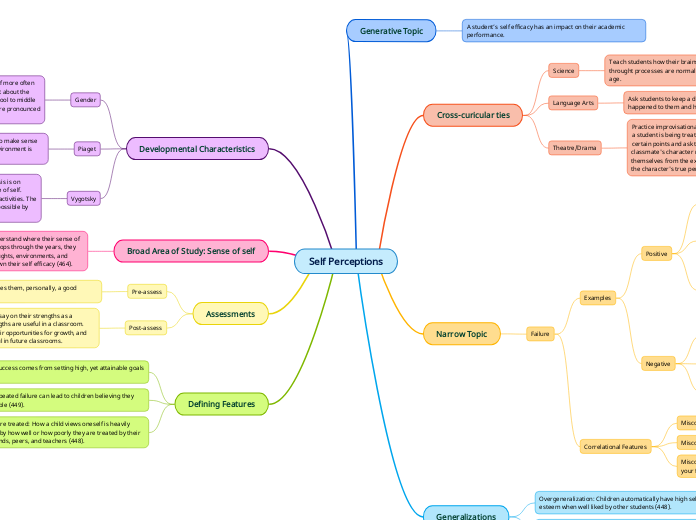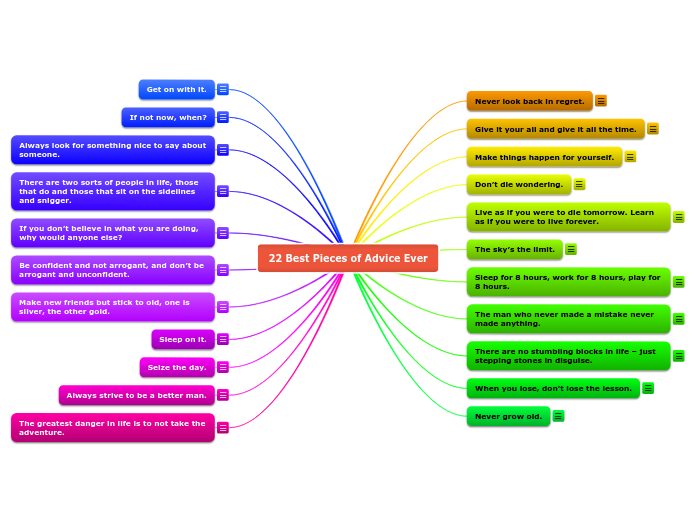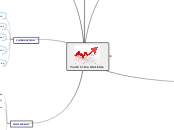Self Perceptions
Defining Features
How they are treated: How a child views oneself is heavily influenced by how well or how poorly they are treated by their family, friends, peers, and teachers (448).
Failure: Repeated failure can lead to children believing they are incapable (449).
Success: Success comes from setting high, yet attainable goals (449).
Assessments
Post-assess
Students will write a short essay on their strengths as a student and how those strengths are useful in a classroom. They will also write about their opportunities for growth, and how that growth will be useful in future classrooms.
Pre-assess
Have students list what makes them, personally, a good student.
Broad Area of Study: Sense of self
When teachers and students understand where their sense of self comes from and how it develops through the years, they can better understand what, thoughts, environments, and situations will build up or tear down their self efficacy (464).
Developmental Characteristics
Vygotsky
Vygotsky believed there needs to be an "[e]mphasis is on nurture" as children grow uip and develop a sense of self. "Children become familiar with tools during daily activities. The capacity for acquiring cultural traditions is made possible by genetically-guided abilities." (24)
Vygotsky's ideas relate more to how we develop through our social interactions (227). This supports the idea that positive social interactions will create a positive self perception.
Piaget
Piaget believed that "[c]hildren are motivated to make sense of their world (nature). Access to a complex environment is vital to development (nurture)." (24)
Piaget believed children should be responsible for their own growth (196). This supports the idea that a child's own experiences, growth, and personal reaching of high standards will build a positive self perception.
Gender
Girls tend to struggle with a positive sense of self more often than boys. "A drop in self-esteem often occurs at about the time that youngsters move from elementary school to middle or junior high school; this drop is sometimes more pronounced for girls." (454)
Generalizations
Undergeneralization: A student’s self confidence only comes from their own success in school (470).
Overgeneralization: Children automatically have high self-esteem when well liked by other students (448).
Narrow Topic
Failure
Correlational Features
Misconception: When you fail to succeed, you are defined by your failures.
Misconception: There is only one way to succeed.
Misconception: Failure is unacceptable.
Examples
Negative
A student believes that they, as a person, are not smart because of a bad grade they received.
A student follows models and instructions exactly for a project, without using any of their own strengths or interests.
A student believes they have to pass every assignment they ever take or else they might as well drop out of school.
Positive
A child feels an increase of self-esteem from achieving their own success. "...[C]hildren appreciate optimistic evaluations from adults but are more likely to be convinced of their own capability when watching themselves reach high standards." (470)
A child sees where they can do better, and works harder at what they didn't do well at the first time. A teacher takes special notice of this, and praises the student for their improvement.
Teacher downplays the seriousness of failure and helps their student see it as an opportunity for growth.
Cross-curicular ties
Theatre/Drama
Practice improvisational roleplay. Reenact a scenario is which a student is being treated unkindly. Ask them to freeze at certain points and ask the other students how their classmate's character may feel and how they may see themselves from the experince. Then ask the students what the character's true percepton of oneself should be.
Language Arts
Ask students to keep a daily journal reflecting on what happened to them and how it made them view themselves.
Science
Teach students how their brains develop over time, and what throught processes are normal to be going through at their age.
Generative Topic
A student’s self efficacy has an impact on their academic performance.









